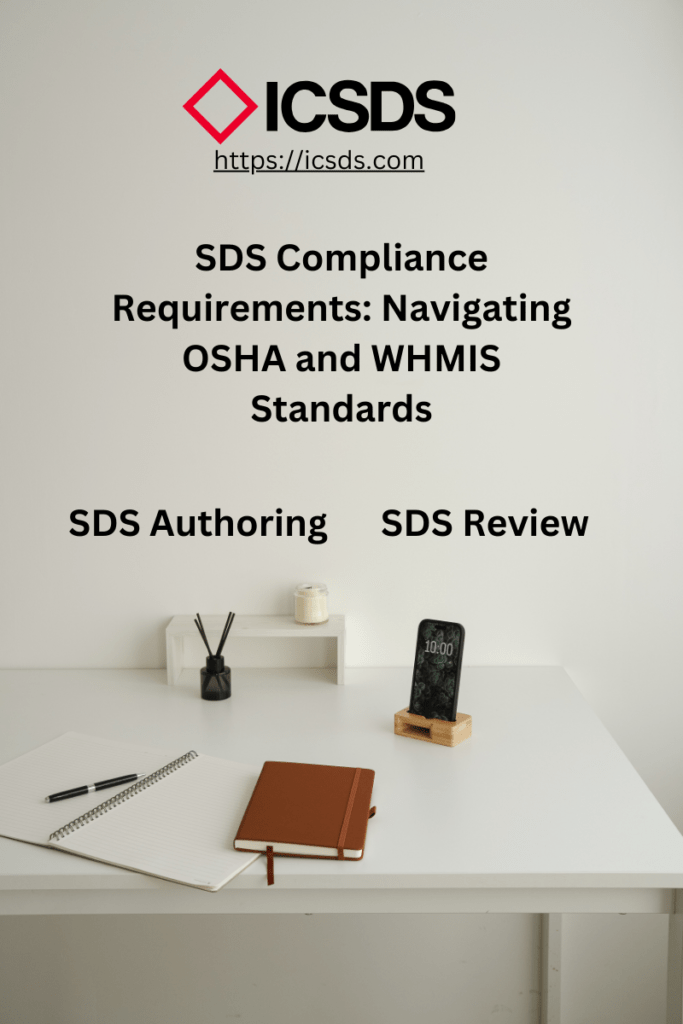Learn how to navigate SDS compliance with OSHA and WHMIS standards. Understand key differences, bilingual requirements in Canada, penalties for non-compliance, and practical tips for compliance.
Table of Contents
- Introduction
- What Are SDS Compliance Requirements?
- OSHA’s Hazard Communication Standard (HCS)
- WHMIS 2015: Canada’s Compliance Framework
- Key Differences Between OSHA and WHMIS
- Importance of Bilingual SDS for Canada
- Penalties for Non-Compliance
- Tips for Staying Compliant
- Conclusion

Introduction
Safety Data Sheets (SDSs) are essential tools for workplace safety and regulatory compliance. However, navigating the compliance landscape can be challenging, especially when dealing with different standards like OSHA in the US and WHMIS in Canada. In this blog, we explore the key differences, the importance of bilingual SDSs, and actionable tips to stay compliant with these regulations.
What Are SDS Compliance Requirements?
An SDS provides critical information about hazardous chemicals, including their properties, handling precautions, and emergency measures. Both the US and Canada require SDSs to align with the Globally Harmonized System (GHS) to ensure consistency and safety.
OSHA’s Hazard Communication Standard (HCS)
The Occupational Safety and Health Administration (OSHA) in the US governs SDS compliance through its Hazard Communication Standard (HCS). Key requirements include:
- Aligning with GHS principles for classification and labeling.
- Providing SDSs in a standardized 16-section format.
- Ensuring accessibility to employees at all times.
WHMIS 2015: Canada’s Compliance Framework
Canada’s Workplace Hazardous Materials Information System (WHMIS 2015) integrates GHS principles while addressing unique regional needs. Key requirements include:
- Standardized labeling and 16-section SDS format.
- Inclusion of both English and French in SDSs and labels.
- Specific hazard classifications and pictograms aligned with Canadian standards.
Key Differences Between OSHA and WHMIS
While both OSHA and WHMIS are based on GHS, there are notable differences:
| Aspect | OSHA (US) | WHMIS (Canada) |
|---|---|---|
| Language | English only | Bilingual (English and French) |
| Hazard Classes | Broader classifications | More specific hazard subclasses |
| Labeling | Less stringent requirements | Mandatory bilingual labeling |
Understanding these distinctions is crucial for businesses operating in both regions.
Importance of Bilingual SDS for Canada
In Canada, WHMIS 2015 mandates that SDSs and labels be available in both English and French. This requirement ensures all workers, regardless of their language preference, can access critical safety information.
Tip: Partner with professional translation services to ensure your SDSs meet bilingual requirements without compromising accuracy.
Penalties for Non-Compliance
Non-compliance with OSHA or WHMIS regulations can result in severe consequences, including:
- Fines: OSHA penalties can reach up to $15,625 per violation, while Canadian authorities impose similar hefty fines.
- Legal Liability: Non-compliance can lead to lawsuits if workplace incidents occur.
- Reputational Damage: Non-compliance undermines trust with employees, clients, and regulators.
Tips for Staying Compliant
- Regularly Update SDSs: Ensure your SDSs reflect the latest regulatory changes and GHS updates.
- Invest in SDS Authoring Software: Tools like Chemwatch or SDSpro can simplify compliance.
- Train Your Team: Educate employees on SDS requirements and proper handling of hazardous materials.
- Engage Experts: Work with compliance professionals like ICSDS to ensure your SDSs meet OSHA and WHMIS standards.
- Conduct Audits: Periodically review your SDS library to identify and address gaps.
Conclusion
Navigating SDS compliance across OSHA and WHMIS standards requires understanding their key differences and addressing region-specific requirements like bilingual SDSs for Canada. By staying proactive, leveraging professional tools, and seeking expert guidance, businesses can ensure compliance and workplace safety.
At ICSDS, we specialize in SDS authoring and compliance management. Whether you’re operating in the US, Canada, or both, our team ensures your SDSs are accurate, compliant, and bilingual. Contact us today to streamline your compliance journey.
